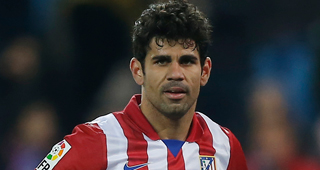One goal every 52 minutes in the world’s best club competition when your name isn’t Ronaldo, Messi or Ibrahimovic is basically the sporting equivalent of Pharrell’s 2013 with ‘Get Lucky’, ‘Blurred Lines’ and ‘Happy’. The dominance of the output is as surprising as its ubiqutiousness.
Diego Costa has scored seven goals in five appearances on 3.8 shots per game to help lead Atlético Madrid into the Champions League quarterfinals. Atlético is also currently second in La Liga between Real Madrid and Barcelona, with Costa scoring 22 goals in 27 appearances (34 percent of their scoring).
The goal Costa scored against AC Milan last week in the third minute was another finish in which he places his hat into the ring as one of the best strikers on the planet.

Similar to Robert Lewandowski last season with Borussia Dortmund, Costa has the capacity to score in bunches and carry a team that can’t compete on paper and in resources against the likes of Real, Bayern and Barça into the final stages of the Champions League.
Regardless of how far Atlético goes in the UCL and their final standing in La Liga, his probable transfer to either Chelsea or Arsenal in the summer, the national team situation of Costa could be the real story of 2014.
Costa was born in Brazil, but he hadn’t appeared in a national team game until two friendlies in March of last year at the age of 24. Costa decided a few months later in October that he preferred to play for Spain and he appeared in a friendly last month.
The fact that Costa’s national team status is being settled at the age of 25 speaks to how he has developed later than most top level players. Mesut Özil was born one week after Costa in 1988 and he already has 53 caps with Germany. Sergio Busquets has 64 caps with Spain and won’t turn 26 until after the World Cup.
Spain’s run of European Championship wins in 2008 and 2012 with the World Cup in 2010 has been unprecedented, but there has been growing belief that the tika-taka is vulnerable at worst and dull at best. Spain has been winning while rarely dominating, taking a lot of 1-0 decisions. It is easy to remember the 4-0 win over Italy in the Euro 2012 final, but they had to rely on penalty kicks to beat Portugal in the semifinals as they were held scoreless.
Lionel Messi certainly isn’t the same player without his Barcelona teammates when he plays for Argentina and Spain isn’t quite the same without Messi finishing even if the results have suggested otherwise.
Costa gives Spain the option of having a classic physical strikes to convert on all of that possession. Costa is an explosive and creative finisher with a 6’2 frame to impose physically in a way we haven’t seen from this Spanish side.
Spain can unquestionably win in Brazil with Cesc Fàbregas playing as the false-nine, but the odds of bowing out randomly against a severely inferior team is far greater in that system.
Equally disconcerting is the prospect of throwing Fernando Torres, who is a shell of his former Liverpool self even if he did score five goals in the Confederations Cup last year. Vicente Del Bosque will almost certainly decide between Costa and Álvaro Negredo with both players giving a different type of look depending on the matchup and who develops the hot foot.
Costa cannot create for himself by dribbling through defenders like Messi, but he can find open space for scoring opportunities in a similar way and is a bigger, stronger target. Negredo is more of a natural fit with more versatility than Costa and gives Spain a better chance for 50/50 balls in the air.
Brazil is setup to win on their home soil except they are shockingly weak at striker and the easily avoidable defection of Costa to Spain leaves them more than exposed.



